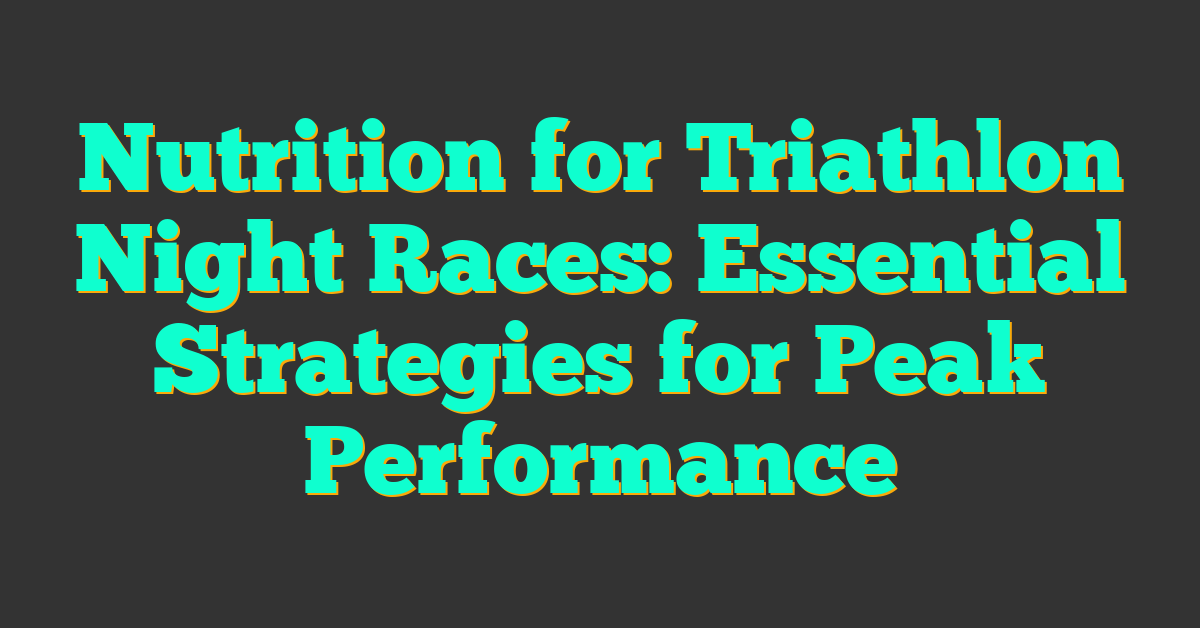Participating in a triathlon at night presents unique challenges, especially when it comes to nutrition. I’ve found that fueling properly can make all the difference between a smooth race and an exhausting one.

Under the stars, your body relies on the right mix of energy and hydration to keep you going strong. In this article, I’ll share the essential nutrition strategies that have helped me—and many others—conquer night races with confidence.
Whether you’re a seasoned athlete or new to night triathlons, understanding how to nourish your body can enhance your performance and overall experience. Let’s dive into the best practices to keep you energized and ready to tackle those nocturnal miles.
Importance of Nutrition in Night Triathlons
Proper nutrition is essential for maintaining energy levels during night triathlons. Without the right fuel, fatigue can set in, impacting performance across swimming, cycling, and running segments. I prioritize a balanced intake of carbohydrates, proteins, and fats to sustain my endurance throughout the race.
Hydration plays a critical role in night races. Cooler temperatures might reduce sweat rates, but staying hydrated aids muscle function and prevents cramps. I carry electrolyte-rich drinks to replenish lost minerals and maintain fluid balance.
Timing my meals and snacks is crucial. Consuming a carbohydrate-rich meal three hours before the race ensures ample energy reserves. During the event, small, frequent snacks like energy bars and gels keep my blood sugar stable, preventing energy drops when darkness makes spotting food sources challenging.
Adaptation to night conditions also influences my nutrition strategy. I experiment with different foods during training to identify what works best for my body. This preparation helps me avoid gastrointestinal issues and ensures I perform optimally under low-light conditions.
Lastly, post-race nutrition aids recovery. I consume a mix of proteins and carbohydrates immediately after finishing to repair muscles and replenish glycogen stores. This approach not only speeds up recovery but also prepares me for future training sessions.
| Nutrition Aspect | Importance | My Strategy |
|---|---|---|
| Energy Intake | Sustains endurance across all race segments | Balanced carbs, proteins, and fats |
| Hydration | Maintains muscle function and prevents cramps | Electrolyte-rich drinks |
| Meal Timing | Ensures ample energy reserves | Carbohydrate-rich meal 3 hours before race |
| In-Race Snacking | Keeps blood sugar stable | Energy bars and gels in small, frequent amounts |
| Adaptation to Conditions | Prevents gastrointestinal issues and optimizes performance | Trial different foods during training |
| Post-Race Recovery | Repairs muscles and replenishes glycogen stores | Mix of proteins and carbohydrates immediately post-race |
By focusing on these nutritional strategies, I enhance my performance and experience during night triathlons.
Pre-Race Nutrition Strategies
Preparing my body with the right nutrition ensures peak performance during night triathlons. I focus on specific strategies to maximize energy and maintain hydration.
Carbohydrate Loading
Carb loading enhances glycogen stores, providing sustained energy. I consume 7-10 grams of carbohydrates per kilogram of body weight in the three days before the race. Foods include pasta, rice, and whole grains to maintain energy levels during the event. For example, I might have oatmeal for breakfast and a large pasta dish for dinner.
Hydration Techniques
Proper hydration supports muscle function and prevents cramps. I start hydrating two days prior, drinking at least 3 liters of water daily. On race day, I consume 500 milliliters of water two hours before the start. During the race, I drink 200-300 milliliters every 20 minutes, using electrolyte-rich beverages to replace lost salts.
| Hydration Schedule | Amount |
|---|---|
| Two days before | 3 liters/day |
| Race morning (2 hours prior) | 500 ml |
| During the race (every 20 minutes) | 200-300 ml |
During-Race Nutrition
Maintaining energy and proper hydration during a night triathlon is essential for peak performance. Here are my strategies to keep fueled and hydrated throughout the race.
Energy Supplements
I rely on easily digestible energy supplements to sustain my performance. Energy gels provide 20-30 grams of carbohydrates each, ideal for quick energy bursts. I consume one gel every 45 minutes during the bike and run segments. Energy bars offer a mix of carbohydrates and proteins, supplying sustained energy; I carry two bars for mid-race refueling. Additionally, electrolyte tablets help maintain my energy levels by replacing lost salts, preventing fatigue and muscle cramps.
Hydration Management
Staying hydrated is crucial, even at night when sweat rates are lower. I aim to drink 250-300 milliliters of an electrolyte-rich beverage every 20 minutes. This approach ensures continuous hydration without overloading my stomach. I prefer drinks containing sodium and potassium to support muscle function and prevent cramps. I also monitor my fluid intake using a hydration plan, adjusting based on the race conditions and my sweat rate. Carrying a lightweight hydration pack allows me to sip fluids regularly without interrupting my pace.
Post-Race Recovery Nutrition
After finishing a night triathlon, replenishing energy and supporting muscle repair is essential. I consume a meal with 1-1.2 grams of protein per kilogram of body weight to aid muscle recovery. Combining proteins with 1-1.5 grams of carbohydrates per kilogram restores glycogen stores depleted during the race. For instance, I choose lean meats like chicken or turkey and whole grains such as quinoa or brown rice.
Hydration remains important post-race. I drink at least 500 milliliters of an electrolyte-rich beverage to replace lost salts and fluids. Additionally, incorporating vitamins and minerals through fruits and vegetables enhances recovery. Examples include bananas for potassium and leafy greens for magnesium.
Including a recovery snack within 30 minutes post-race accelerates muscle repair. I often opt for a protein shake with a scoop of whey protein and a piece of fruit. This combination ensures my body receives necessary nutrients promptly.
Post-Race Nutrition Summary
| Nutrient | Amount per kg Body Weight | Examples |
|---|---|---|
| Protein | 1-1.2 g/kg | Chicken, turkey, tofu |
| Carbohydrates | 1-1.5 g/kg | Quinoa, brown rice, fruits |
| Electrolytes | 500 ml drink | Sports drinks, coconut water |
| Vitamins & Minerals | Through balanced meals | Bananas, leafy greens |
Special Considerations for Night Events
Night triathlons present unique nutritional challenges that require tailored strategies to ensure optimal performance and comfort.
Temperature and Hydration Adjustments
« Best Swim Caps for Long Hair in Triathlon: Top Picks for Performance & Comfort
Top Yoga Poses for Triathlon Flexibility: Boost Performance & Prevent Injuries »
Cooler nighttime temperatures reduce sweat rates, affecting hydration needs differently.
- Hydration Strategy: I aim to drink 250-300 milliliters of an electrolyte-rich beverage every 20 minutes.
- Electrolyte Intake: I use electrolyte tablets to replace lost salts and prevent cramps.
- Fluid Balance: Cooler weather may decrease the need for excessive hydration, so I adjust my intake based on actual sweat loss.
Snack Choices for Low Light Conditions
Visibility impacts how I consume and manage snacks during the race.
- Easy-to-Handle Foods: I choose energy gels and bars that are simple to open and consume in the dark.
- Consistent Energy Supply: Small, frequent snacks every 45 minutes maintain stable blood sugar levels.
- Packaging: I opt for packaging with tactile markers to quickly identify my snacks without fumbling.
Timing Adjustments for Nutrition
Race start times at night influence my meal and snack scheduling.
- Pre-Race Meal: I consume a carbohydrate-rich meal three hours before the race to ensure energy reserves.
- Late-Night Nutrition: If the race starts late, I adjust my pre-race meal to prevent sleep disturbances, opting for easily digestible carbohydrates.
- During Race Eating: I stick to my planned schedule of energy gels and bars to maintain consistent energy levels throughout the event.
Managing Caffeine and Stimulants
Staying alert is crucial during night races, and caffeine plays a role in my strategy.
- Caffeine Intake: I include caffeine in my energy supplements to enhance focus and reduce perceived effort.
- Dosage: I limit caffeine to 50-100 milligrams per hour to avoid jitters and gastrointestinal issues.
- Timing: I time caffeine consumption with my energy gels to synchronize the effects with my energy needs.
Nutrition Table for Night Triathlon
| Nutrition Aspect | Strategy | Quantity/Timing |
|---|---|---|
| Pre-Race Meal | Carbohydrate-rich meal | 3 hours before race, 7-10 g/kg carbs |
| Hydration | Electrolyte-rich beverages | 250-300 ml every 20 minutes |
| Energy Supplements | Energy gels and bars | Every 45 minutes during bike and run |
| Caffeine | Included in energy supplements | 50-100 mg per hour |
| Post-Race Recovery | Protein and carbohydrate intake | Within 30 minutes post-race |
By addressing these special considerations, I ensure that my nutrition strategy is effectively tailored to the unique demands of night triathlons, enhancing my performance and overall race experience.
Conclusion
Preparing for a night triathlon with the right nutrition made all the difference for me. Choosing the right foods and staying hydrated helped me push through each segment with energy and focus. I found that small snacks during the race kept my energy levels steady and prevented fatigue.
After crossing the finish line, proper recovery nutrition sped up my muscle repair and got me ready for my next training session. Tailoring my nutrition based on what I learned through training ensured I avoided any issues during the race.
If you’re tackling a night triathlon, paying attention to your nutrition can greatly enhance your performance and overall experience. Trust me, the effort you put into planning your meals and hydration will pay off when you see yourself performing your best under the stars.










